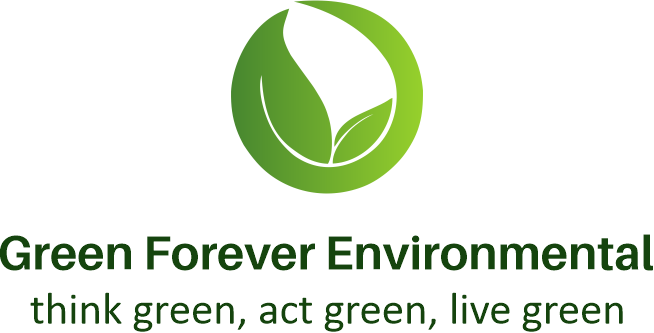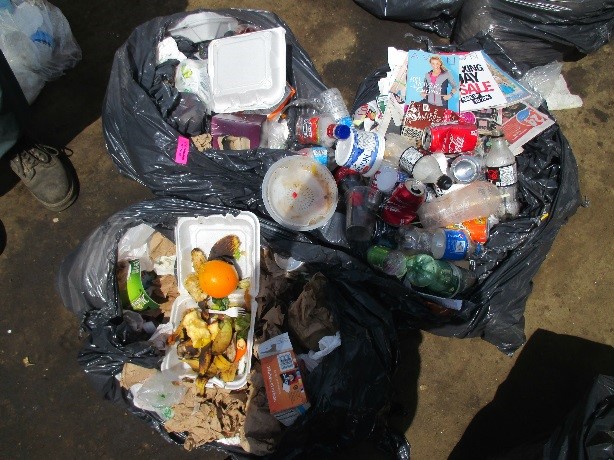What is a Waste Audit?

A waste audit is the study of regular waste composition produced at a designated entity. It provides you with a thorough understanding of problem areas especially within your building.
Our waste auditors will examine your waste by looking at bags of waste, sorting items, recording and analyzing the data. By so doing, we are able to identify the amount of each waste type according to the weight. This also helps identify what’s thrown out as waste and what your building recycles or reuses.
A waste audit helps you see exactly what you are throwing out as waste. This just means that without a waste audit, you really do not know what’s going on in your waste stream.
A waste audit will let you know if you need to improve your programs and it is also a great way to measure the success of your building’s waste and recycling programs.
Green Forever Environmental conducts waste audits for office buildings, schools, shopping complexes, shopping establishments, hospitals, hotels, restaurants and even manufacturing establishments.
A waste audit helps characterize and quantify waste streams and it also tells you how well your business is doing. For example with the help of a waste audit, you are able to tell what types and amount of materials – whether cans, bottles, plastics, paper/ cardboard or organics and your building generates.
If you’re wondering who needs a waste audit, well I have to say every business needs it. There are various levels of waste audit from a basic one to a comprehensive waste audit. You can choose the one that’s right for your building.
Wouldn’t it be great to know how much of your garbage is actually garbage? Well, the only way to know is by conducting a waste audit.
Who needs a Waste Audit?
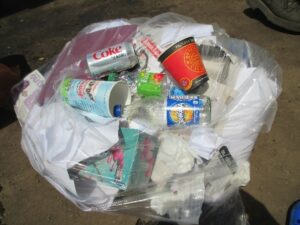
I have answered the question “What is a Waste Audit” but who really needs to carry out a waste audit?
The answer is this….every business needs a waste audit. This could be an office building, a school, restaurant, hotel, hospital, shopping mall. You could even carry out a waste audit in your home.
Waste Audits reveal what you are throwing out as waste, what you are diverting (by reusing or recycling) and the amount of each type of material.
Property Managers, Facility Managers or anyone in charge of an office building, a shopping complex, restaurant, schools, hospitals or hotel is encouraged to carry out waste audits at least once a year. Waste audits will reveal problem areas and even reduce costly spending.
The Stats are Scary! Time to Act is Now!
According to Statistics Canada, Ontarians sent over 10 million tonnes of waste to landfill in 2018. This is an increase by a little over 600,000 tonnes from 2016 data! 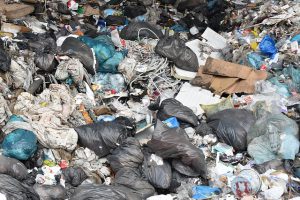
I’ll break it down for you right here:
- In 2016, Ontario’s residential waste figure was 3,703,850 tonnes and the non-residential waste figure was 5,771,622 tonnes
- In 2018, Ontario’s residential waste figure was 3,980,665 tonnes and the non-residential waste figure was 6,104,948 tonnes.
Note that non residential waste is waste from the industrial, commercial, institutional and construction sectors.
If our waste continues to increase at this rate, it is believed that Ontario will run out of landfill capacity by 2032!
Is Waste Audit a New Term?
The simple answer is No. Many people are not just aware that there is actually something called waste audit.
I attended a workshop a while back and was asked to talk briefly about what I do. I explained the nature of my work at Green Forever Environmental and that our services include carrying out waste audits for clients, ensuring recyclable materials are properly diverted from waste and monitoring clients’ sites to ensure their programs are running smoothly.
Some people did not understand what “waste audit” meant so I explained to them what that meant. Someone actually told me that its uncommon and kind of unique to be auditing organizations’ waste and recycling.
I quickly explained to them that aside from the fact that organizations end up saving money on garbage pick up costs, it is important to carry out waste audits regularly in order to protect the environment for ourselves and future generations.
At the workshop, I also explained the compliance aspect of Waste Audits. In Ontario Canada, there are regulations in place that require specific buildings to conduct regular waste audits and source separate their waste.
Waste Audit Benefits: Why Every Business Should Carry Out A Waste Audit
1. Waste audits can help you determine the effectiveness of your waste and recycling program
A waste audit will reveal if you are throwing out too much stuff. Why not stop guessing and find out what is going on or what the problem is?
A waste audit will let you know if your waste/recycling program is working or not. It can reveal wasteful areas and at the same time it can expose successful areas. This will allow you make adjustments and help keep your garbage “small” and it also helps you divert a lot of materials from waste.
Waste audits also help improve your 3Rs practices – Reduce, Reuse, Recycle. The saying goes “one man’s waste is another man’s resource.
Simply put a waste audit will assist you in clearly identifying the types of waste you generate – whether you’re generating too much paper, containers such as cans, bottles, plastics and glass.
Your business could be generating a lot of paper and you may not know it but a waste audit will let you know if your staff is wasting paper.
A waste audit will let you know that you need to take action. In this case, you may need to educate your staff or the solution may be to improve the existing recycling program.
2. Track your building’s success with the help of Waste Audits
As a property manager or the owner of a building, the first waste audit you carry out will serve as an eyeopener into the different types of waste and recyclable materials your building generates. Once you have conducted this waste audit, don’t stop there. Continue to carry out waste audits regularly and compare results to see if your recycling programs are improving.
An office building started training their staff after a waste audit revealed that 50% of their garbage was made up of recyclable materials. This same building conducted a follow up audit the following year and the audit revealed that the amount of recyclable materials found in the waste had reduced by 40%!
This proves that waste audits help assess effectiveness and determine ways to improve a building’s current waste management systems.
3. Waste audits help you stay in compliance with regulations and avoid fines
In Ontario Canada, specific organizations in the Industries, Commercial and Institutional (IC&I) sector are required to carry out Waste audits as they are necessary to gain compliance with Ontario regulations 102/94.
They are also required to have source separation programs (Ontario regulations 103/94) for materials including paper, cans, bottles, plastics.
Waste audits are also part of the requirements for certification standards such as LEED (Leadership in Energy and Environmental Design). A thorough analysis of your building’s waste stream is required in order to comply with LEED for Existing Buildings Operations & Maintenance.
4. Property Managers can save money by carrying out Waste audits in their office buildings
Waste audits reveal what types of waste your building generates; so by reducing the amount of garbage you generate, you may be able to reduce your waste disposal fees.
- You may think your office building is generating a lot of garbage when it really isn’t or you may not know for sure if you are throwing out a lot of garbage or not.
- It could be that your building does not have an organics program and you are simply throwing out food waste instead of setting up an organics program to divert food waste from landfill! But how do you know the types of waste you’re actually throwing out? The only way to know this is to have a waste audit conducted. Some audits we conducted for our clients led to these type of findings. This just shows that waste audits help identify waste diversion opportunities.
Waste Audit Key Points
If you are a Property Manager, a Facility Manager or you’re in charge of a building; in summary Waste Audits will help you: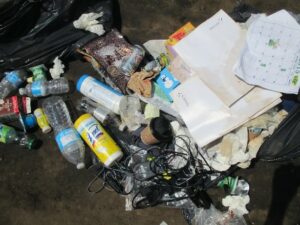
– Quantify waste streams.
– Divert waste from landfill.
– Save money and keep company’s garbage low.
– Reduce waste from its point of generation.
– Identify new programs and Improve existing waste and recycling programs.
-Protect the Environment for us and future generations
Conclusion
I hope this post has answered the question, What is a Waste Audit? Office buildings, Schools, Hospitals, Hotels, Shopping complexes are all encouraged to conduct regular waste audits.
Green Forever Environmental can help you with your waste audit. We can also help you with your recycling programs and if you don’t have a program in place, we can help you with that!
By adopting best practices such as conducting regular waste audits and implementing recycling programs, your building can move closer to your zero waste goals just like other buildings who have already applied sustainable waste management practices to their operations!
As a Property or Facility Manager, you should know the amount and types of waste you generate and conduct a waste audit, at least once a year.
If you are unsure whether your building is diverting enough materials from landfill, a waste audit will help you. If you are not in compliance with waste audit regulations in Ontario, Canada, ensure you have one conducted as soon as possible to avoid fines.
Are you just hearing about waste audits for the first time? If your building has carried out waste audits what was your experience like? Were you able to keep your garbage disposal costs low and did it improve your diversion rate? Does your building(s) need help with your garbage.? We’d love to hear from you.
